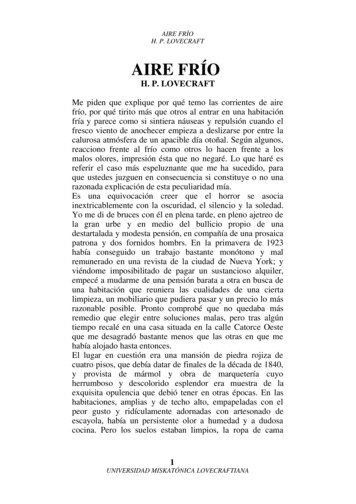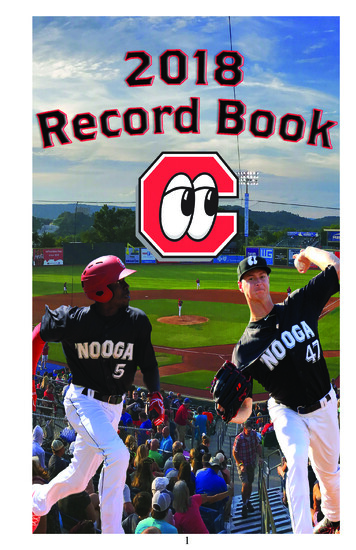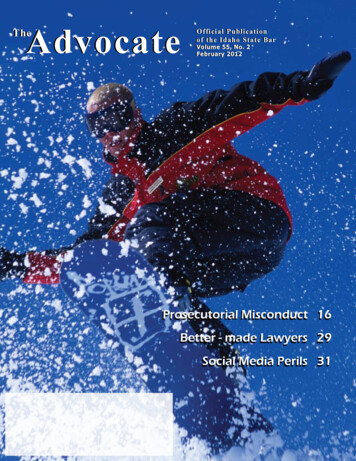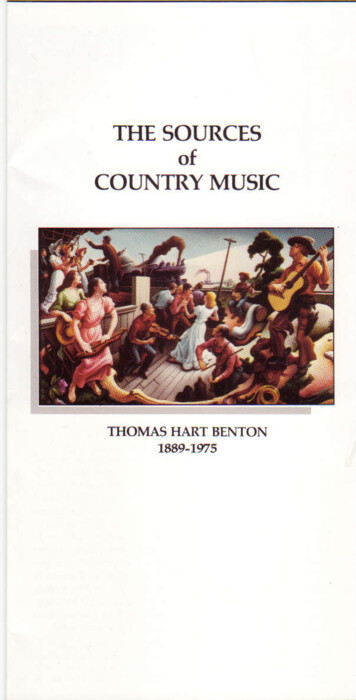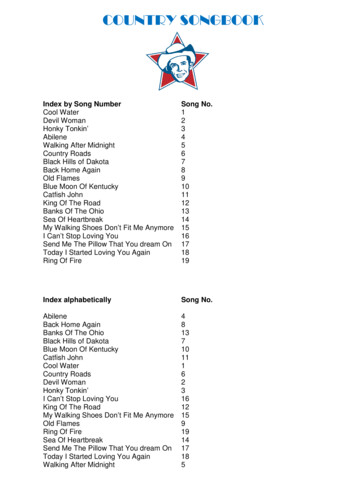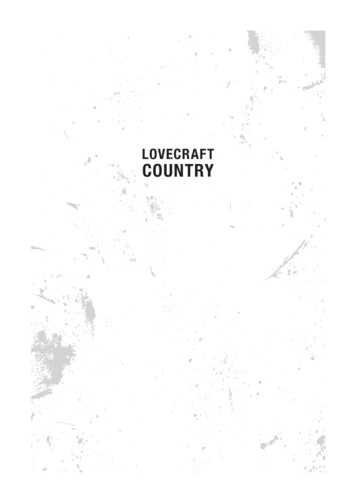
Transcription
LOVECRAFTCOUNTRYLovecraftCountry i-viii,1-376 3p MB1118.indd 111/18/15 12:06 PM
AL SO BY MAT T RUFFThe MirageBad MonkeysSet This House in Order: A Romance of SoulsSewer, Gas & Electric: The Public Works TrilogyFool on the HillLovecraftCountry i-viii,1-376 3p MB1118.indd 211/18/15 12:06 PM
LOVECRAFTCOUNTRY AN OVEL MATT RUFFHARPERAn Imprint of HarperCollinsPublishersLovecraftCountry i-viii,1-376 3p MB1118.indd 311/18/15 12:06 PM
Copyrightlovecraft country. Copyright 2016 by Matt Ruff. All rights reserved. Printedin the United States of America. No part of this book may be used or reproducedin any manner whatsoever without written permission except in the case of briefquotations embodied in critical articles and reviews. For information, addressHarper Collins Publishers, 195 Broadway, New York, NY 10007.Harper Collins books may be purchased for educational, business, or salespromotional use. For information, please e- mail the Special Markets Department atSPsales@harpercollins.com.first editionDesigned by Jaime PutortiCopyright for images: cajoer/Shutterstock, Inc.Library of Congress Cataloging- in- Publication Data has been applied for.ISBN: 978- 0 - 06- 229206- 316 17 18 19 20 ov/rrd 10 9 8 7 6 5 4 3 2 1LovecraftCountry i-viii,1-376 3p MB1118.indd 411/18/15 12:06 PM
DedicationF O R H A RO L D A ND RI TA LovecraftCountry i-viii,1-376 3p MB1118.indd 511/18/15 12:06 PM
LovecraftCountry i-viii,1-376 3p MB1118.indd 611/18/15 12:06 PM
LOVECRAFTCOUNTRYLovecraftCountry i-viii,1-376 3p MB1118.indd 711/18/15 12:06 PM
LovecraftCountry i-viii,1-376 3p MB1118.indd 811/18/15 12:06 PM
LOVECRAFT COUNTRY JIM CROW MILE— A unit of measurement, peculiar to colored motorists, comprising both physical distance and random helpings of fear,paranoia, frustration, and outrage. Its amorphous nature makes exacttravel times impossible to calculate, and its violence puts the traveler’sgood health and sanity constantly at hazard.— The Safe Negro Travel Guide, Summer 1954 editionAtticus was almost home when the state trooper pulled him over.He’d left Jacksonville two days before in a secondhand ’48 Cadillac Coupe that he’d bought with the last of his Army pay. The first dayhe drove 450 miles, eating and drinking from a basket he’d packed inadvance, stopping the car only to get gas. At one of the gas stops thecolored restroom was out of order, and when the attendant refused himthe key to the whites’ room, Atticus was forced to urinate in the bushesbehind the station.He spent the night in Chattanooga. The Safe Negro Travel Guidehad listings for four hotels and a motel, all in the same part of the city.Atticus chose the motel, which had an attached 24- hour diner. Theprice of the room, as promised by the Guide, was three dollars.In the diner the next morning he consulted a road atlas. He hadanother six hundred miles to go to Chicago. Midway along his intendedroute was the city of Louisville, Kentucky, which according to theGuide had a restaurant that would serve him lunch. Atticus considered it, but any inclination to further delay his homecoming was overwhelmed by a desire to put the South behind him, so after he finishedLovecraftCountry i-viii,1-376 3p MB1118.indd 111/18/15 12:06 PM
2MATT RUFFbreakfast he got the basket from his car and had the diner cook fill itwith sandwiches and Cokes and cold fried chicken.Around one p.m. he reached the Ohio River, which marked theborder between Kentucky and Indiana. As he crossed the water on abridge named for a dead slave owner, Atticus cocked his arm out thewindow and bade Jim Crow farewell with a raised middle finger. Awhite driver coming the other way saw the gesture and shouted something vile, but Atticus just laughed and stepped on the gas, and sopassed into the North.An hour later along a stretch of farmland the Cadillac blew a tire.Atticus wrestled the car to a safe stop at the roadside and got out toput on the spare, but the spare was flat, too. He was frustrated bythis— he’d checked the spare before setting out, and it had seemed finethen— but however much he frowned at it, the spare remained resolutein its flatness. A Southern tire, Atticus thought: Jim Crow’s revenge.Behind him for at least ten miles there was nothing but fields andwoods, but looking ahead on the road he could see, perhaps two milesdistant, a cluster of buildings. Taking The Safe Negro Travel Guide withhim, he started walking. There was traffic on the road, and at first ashe walked he tried waving down vehicles that were headed his way,but the drivers all either ignored him or sped up to get past him, andeventually he gave up and just concentrated on putting one foot in frontof the other.He came to the first of the buildings. The sign out front said janssen’s auto repair, and Atticus thought he might be in luck until hesaw the Confederate flag hanging above the garage entrance. That wasalmost enough to make him keep walking, but he decided he had to try.Inside the garage were two white men: a little fellow with a peach- fuzz mustache who sat on a high stool reading a magazine, and a muchbigger man who was bent under the open hood of a pickup truck. AsAtticus entered, the little man looked up from his magazine and madea rude sucking sound between his teeth.LovecraftCountry i-viii,1-376 3p MB1118.indd 211/18/15 12:06 PM
LOVECRAFT COUNTRY3“Excuse me,” Atticus said. This got the attention of the big man. Ashe straightened up and turned around, Atticus saw he had a tattoo ofwhat looked like a wolf’s head on his forearm.“Sorry to disturb you,” Atticus said, “but I’ve had some trouble. Ineed to buy a tire.”The big man glared at him for a moment, then said flatly: “No.”“I can see you’re busy,” said Atticus, as if that might be the problem.“I’m not asking you to change it for me. Just sell me the tire, and I’ll— ”“No.”“I don’t understand. You don’t want my money? You don’t have todo anything, just— ”“No.” The big man crossed his arms. “You need me to say it anotherfifty times? Because I will.”And Atticus, fuming now, said: “That’s a Wolfhound tattoo, right?Twenty- seventh Infantry regiment?” He fingered the ser v ice pin on hisown lapel. “I was with the 24th Infantry. We fought alongside the 27thacross most of Korea.”“I wasn’t in Korea,” the big man said. “I was at Guadalcanal, andLuzon. And there weren’t any niggers there.”With that he bent under the truck hood again, his back both adismissal and an invitation. Leaving Atticus to decide which way hewanted to take it. The collective indignities of the past months in Florida made it a closer call than Atticus liked. The little man on the stoolwas still looking at him, and if he’d said anything or even cracked asmile Atticus would have gone in swinging. But the little man, perhapssensing how quickly he could lose his teeth even with the big man toprotect him, did not smile or speak, and Atticus stalked off with hisfists at his sides.Across the road was a general store with a pay phone on its frontporch. Atticus looked in the Guide and found a listing for a Negro- owned garage in Indianapolis, some fifty miles away. He placed the calland explained his predicament to the mechanic who answered. TheLovecraftCountry i-viii,1-376 3p MB1118.indd 311/18/15 12:06 PM
4MATT RUFFmechanic was sympathetic and agreed to come help, but warned thatit would be a while. “That’s OK,” Atticus said. “I’ll be here.”He hung up and noticed the old woman inside the general storewatching him nervously through the screen door. Once again, he choseto turn and walk away.He went back to the car. In the trunk beside the useless sparewas a cardboard box filled with battered paperbacks. Atticus selected acopy of Ray Bradbury’s The Martian Chronicles. He sat in the Cadillacand read about the “rocket summer” of 1999, when winter’s snows weremelted by the exhaust from a Mars- bound spacecraft. He imaginedhimself aboard, rising into the sky on a jet of fire, leaving North andSouth behind forever.Four hours passed. He read all of The Martian Chronicles. Hedrank warm Coke and ate a sandwich, but mindful of the gaze of passing motorists, he did not touch the fried chicken. He perspired in thebreezeless June heat. When his bladder could no longer be ignored, hewaited for a lull in the traffic and went behind a sycamore that grewby the roadside.It was after seven o’clock when the tow truck arrived. The driver,a gray- haired, light- skinned Negro, introduced himself as Earl Maybree. “Earl, just Earl,” he insisted, when Atticus tried to call him Mr.Maybree. He lifted the replacement tire from the rear of the tow truck.“Let’s get you back on your way.”With the two of them working together it took less than ten minutes. The simplicity of it, and the thought of the afternoon just wastedfor no good reason, started Atticus fuming again. He stepped awayfrom the car to compose himself, pretending to study the sun nowhanging low on the horizon.“How far do you have to go?” Earl asked him.“Chicago.”Earl raised an eyebrow. “Tonight?”“Well . . . That was the plan.”LovecraftCountry i-viii,1-376 3p MB1118.indd 411/18/15 12:06 PM
LOVECRAFT COUNTRY5“Tell you what,” Earl said. “I’m done for the day. Why don’t youcome home with me, let my wife fix you a real dinner. Maybe restawhile.”“No, sir, I couldn’t.”“Sure you could. It’s on your way. And I wouldn’t want you to leaveIndiana thinkin’ it’s all bad people.”Earl lived in the colored district around Indiana Avenue northwestof the state capitol building. His house was a narrow wooden two- storywith a tiny patch of grass out front. When they arrived the sun had setand clouds were blowing in from the north, hastening the darkness. Inthe street, a stickball game was in progress, but now the mothers of theplayers were calling them inside.Earl and Atticus went inside too. Earl’s wife, Mavis, greeted Atticus warmly and showed him where he could wash up. Despite thewelcome, Atticus was apprehensive sitting down at the kitchen table,for many of the obvious topics of dinner conversation— his ser v ice inKorea; his stay in Jacksonville; today’s events; and most of all his fatherin Chicago— were things he didn’t really care to talk about. But afterthey’d said grace, Earl surprised him by asking what he’d thought ofThe Martian Chronicles. “I saw you had it in the car.”So they talked about Ray Bradbury, and Robert Heinlein, and IsaacAsimov, all of whom Earl liked; and L. Ron Hubbard, whom he didn’t;and the Tom Swift series, which Earl had loved when he was young butwhich embarrassed him now, both for the books’ depiction of Negroesand for the fact that as a boy he hadn’t noticed it, despite his father’srepeated attempts to point it out to him. “Yeah, my pop had some problems with my reading choices too,” Atticus said.Mavis said little during the meal, seeming content to listen andto refill Atticus’s plate whenever it was in danger of being emptied.By the time they finished dessert it was full dark and rain was drumming on the kitchen window. “Well,” Mavis spoke up at last. “You can’tdrive any farther tonight in this.” Atticus, past the point of even tokenLovecraftCountry i-viii,1-376 3p MB1118.indd 511/18/15 12:06 PM
6MATT RUFFresistance, allowed himself to be led upstairs to the spare bedroom.There on the dresser was a photograph of a young man in uniform. Ablack ribbon had been tied around a corner of the frame. “Our Dennis,”Mavis said, or so Atticus thought. But as she began to put fresh sheetson the bed, she added: “He died in the forest,” and Atticus realized shewas talking about the Ardennes.Atticus lay in bed with a book Earl had offered him: more Bradbury, a short story collection called Dark Carnival. It was a nice gesturebut not really the best bedtime fare. After reading one story about avampire family reunion and another, very strange tale about a man whohad his skeleton removed, Atticus shut the book, gazed for a momentat the Arkham House imprint on its spine, and set it aside. He reachedfor his trousers and got out the letter from his father. Reading it overagain, he touched a finger to a word written near the bottom of thepage. “Arkham,” he whispered.The rain stopped at three in the morning. Atticus opened his eyesin the silence, unsure at first what country he was in. He dressed inthe dark and crept downstairs, thinking to leave a note, but Earl wasawake, sitting at the kitchen table with a cigarette.“Sneakin’ out?” Earl said to Atticus.“Yes, sir. I appreciate the hospitality, but I need to get home.”Earl nodded and made a little shooing gesture with his cigarette hand.“Tell Mrs. Maybree thank you for me. Tell her I said goodbye.”Earl made the shooing gesture again. Atticus got in his car anddrove off through the dark and still- damp streets, feeling like the ghostin whose bed he had slept.By first light he was well to the north. He passed a sign readingchicago— 52. The state trooper was parked on the shoulder on the opposite side of the road. The trooper had been napping, and had Atticuscome even five minutes earlier he might have passed by unnoticed, butin the pink dawnlight the trooper sat up blinking and yawning. He sawAtticus driving by and came fully alert.LovecraftCountry i-viii,1-376 3p MB1118.indd 611/18/15 12:06 PM
LOVECRAFT COUNTRY7Atticus watched in the rearview as the patrol car made a U- turnonto the road. He got the Cadillac’s registration and bill of sale fromthe glove box and put them on the passenger seat along with his driver’slicense, everything in plain sight so there’d be no confusion about whathe was reaching for. Lights flashed in the rearview and the police sirencame on. Atticus pulled over, rolled down his window, and as he’d beentaught to do in his very first driving lesson, gripped the top of the steering wheel with both hands.The trooper took his time getting out of the patrol car, stopping tostretch before ambling up alongside the Cadillac.“Is this your car?” he began.“Yes, sir,” Atticus said. Without taking his hands off the wheel, heinclined his head towards the papers in the passenger seat.“Show me.”Atticus handed him the documents.“Atticus Turner,” the state trooper said, reading the name off hislicense. “You know why I stopped you?”“No, sir,” Atticus lied.“You weren’t speeding,” the trooper assured him. “But when I sawyour license plate, I got worried you might be lost. Florida is the otherway.”Atticus gripped the wheel a little tighter. “I’m going to Chicago.Sir.”“What for?”“Family. My dad needs me.”“But you live in Florida?”“I’ve been working down in Jacksonville. Since I got out of theser v ice.”The trooper yawned without bothering to cover his mouth. “Beenworking, or still working?”“Sir?”“Are you going back to Florida?”LovecraftCountry i-viii,1-376 3p MB1118.indd 711/18/15 12:06 PM
8MATT RUFF“No, sir. I don’t plan to.”“You don’t plan to. So you’re staying in Chicago?”“For a while.”“How long?”“I don’t know. As long as my father needs me.”“And then what?”“I don’t know. I haven’t decided.”“You haven’t decided.” The trooper frowned. “But you’re just passing through, here. Right?”“Yes, sir,” Atticus said, resisting the temptation to add, “if you’ll letme.”Still frowning, the trooper shoved the documents back throughthe window. Atticus replaced them on the passenger seat. “What’s inthere?” the trooper asked next, pointing at the basket on the floor.“What’s left of my lunch, from yesterday.”“What about in back? Anything in the trunk?”“Just my clothes,” Atticus said. “My Army uniform. Some books.”“What kind of books?”“Science fiction, mostly.”“Science fiction? And this is your car?”“Officer— ”“Step out.” The trooper moved back from the door and placed ahand on the butt of his revolver. Atticus got out of the car, slowly.Standing, he was an inch taller than the trooper; his reward for thisimpertinence was to be spun around, shoved up against the Cadillac,and roughly frisked. “All right,” said the trooper. “Open the trunk.”The trooper pawed through Atticus’s clothes first, patting downthe sides of his duffel bag as if it too were a black man braced against acar. Then he turned to the books, dumping the box out into the trunk.Atticus tried not to care, telling himself paperbacks were meant to beabused, but it was hard, like watching friends get knocked around.LovecraftCountry i-viii,1-376 3p MB1118.indd 811/18/15 12:06 PM
LOVECRAFT COUNTRY9“What’s this?” The trooper picked up a gift- wrapped object thathad been at the bottom of the box.“Another book,” Atticus said. “It’s a present for my uncle.”The trooper tore off the wrapping paper, revealing a hardboundvolume. “A Princess of Mars.” He looked sideways at Atticus. “Youruncle likes princesses, does he?” He tossed the book into the box, Atticus dying a little as it landed splayed open, bending pages.The trooper circled the Cadillac. When he opened the passenger door, Atticus thought he was going after The Martian Chronicles,which was still up front somewhere. But the trooper came up holdingThe Safe Negro Travel Guide. He thumbed through it, at first puzzledand then astonished. “These addresses,” he said. “These are all placesthat serve colored people?” Atticus nodded. “Well,” said the trooper, “ifthat doesn’t beat everything . . .” He squinted at the Guide edge- on.“Not very thick, is it?” Atticus didn’t respond to that.“All right,” the trooper said finally. “I’m going to let you go. But I’mkeeping this guidebook. Don’t worry,” he added, forestalling the objection that Atticus knew better than to make, “you won’t need it anymore.You say you’re going to Chicago? Well, between here and there, there’sno place that you want to stop. Understood?”Atticus understood.The main office of the Safe Negro Travel Company (George Berry,proprietor) was in Washington Park on Chicago’s South Side. Atticusparked in front of the Freemasons’ temple next door and sat watchingthe early morning pedestrians and the drivers going by, not a white faceamong them. There were streets in Jacksonville where you’d rarely seea white person either, but this street, this neighborhood, was home— had, once upon a time, been Atticus’s whole world— and it soothed himlike nothing save his mother’s voice could. As he relaxed, the ball insideLovecraftCountry i-viii,1-376 3p MB1118.indd 911/18/15 12:06 PM
10MATT RUFFhim unwinding by slow degrees, he reflected that the state trooper hadbeen right: Here, he needed no guide.The travel office was still closed at this hour, but Atticus could seea light on in the apartment above it. Rather than ring the buzzer, hewent around to the alley and climbed the fire escape to knock at thekitchen door. From within he heard the scrape of a chair and the raspof the door bolt. The door opened halfway and Uncle George peeredout warily. But when he saw who it was he cried out “Hey!” and threwthe door wide, drawing Atticus into a tight embrace.“Hey yourself,” Atticus said laughing, returning the hug.“Man, it’s good to see you!” Stepping back, George gripped Atticusby the shoulders and looked him up and down. “When did you get back?”“Just rolled in now.”“Well come on inside.”Entering the kitchen, Atticus was struck by the funhouse sensation that had dogged him on his only other visit home since joining themilitary. Though he’d reached his full growth— just— before enlisting, in his strongest memories of this place he’d been a much smallerperson, so that the room seemed to have shrunk. When his uncle hadshut the door and turned to embrace him a second time, Atticus realized George had shrunk too, though in George’s case that just meantthey were now the same height.“Is Aunt Hippolyta home?” Atticus asked, curious to take her measure as well.“No,” said George. “She’s in Wyoming. There’s this new spa openedup near Yellowstone, run by Quakers if you can believe it. Supposedlyopen to everyone. She’s checking it out.” Early in their marriage, Hippolyta had volunteered herself as a scout for The Safe Negro TravelGuide, specializing in vacation resorts. Initially she and George hadtraveled together, but these days she most often went alone, leavingGeorge home to care for their son. “She’ll be gone at least a week. ButI know Horace will be glad to see you, once he wakes up.”LovecraftCountry i-viii,1-376 3p MB1118.indd 1011/18/15 12:06 PM
LOVECRAFT COUNTRY11“Horace is still sleeping?” Atticus was surprised. “School year’s notover already, is it?”“Not quite,” George said. “But today’s Saturday.” Laughing at Atticus’s reaction to this news: “Guess I don’t have to ask how your trip was.”“No, you don’t.” He held out the book he’d carried like a brokenbird from the car. “Here.”“What’s this . . . Ah, Mr. Burroughs!”“Souvenir from Japan,” Atticus said. “I found this bookstore outsidethe base in Gifu, guy had one shelf of books in English, almost all science fiction . . . I thought that might be a first edition, but now I thinkit’s just old.”“Well- traveled,” George said. The book fell open to the bentpages; Atticus had done his best to flatten them, but the creasing waspermanent.“Yeah, it was in better shape when I bought it.”“Hey, that’s OK,” George said. “Should still read just fine.” Hesmiled. “Come on, let’s put this in the place of honor.” He headed forthe bedroom he and Hippolyta shared with their best books.Atticus followed him partway, stopping outside the apartment’sother bedroom to look in on his cousin. Horace, twelve years old, lay onhis back with his mouth open, his breath wheezy and labored. Therewas an issue of Tom Corbett, Space Cadet beside his pillow and morewere scattered on the floor.A short- legged easel desk faced the wall opposite the bed. A sheetof construction paper on the desk had been divided into panels containing scenes from an intergalactic adventure: Negroes in capes, wandering through a Buck Rogers landscape. Atticus studied it from thedoorway, head tilted as he tried to pick up the thread of the story.George came back down the hall. “He’s getting really good,” Atticus said, keeping his voice low.“Yeah, he’s been trying to talk me into starting a comics line. I toldhim if he saves up enough of his own money, I might go in with him onLovecraftCountry i-viii,1-376 3p MB1118.indd 1111/18/15 12:06 PM
12MATT RUFFa small print run . . . So, you hungry? Why don’t I get him up, call yourfather, and we all go out to breakfast together. You seen Montrose yet?”“Not yet,” said Atticus. “And before I do, there’s something I needto talk to you about.”“All right. Go make yourself comfortable, I’ll put coffee on.”While George busied himself in the kitchen, Atticus went out tothe front parlor, which in childhood had served him as both library andreading room. The bookshelves were divided into his and hers, AuntHippolyta’s interests running primarily to science and natural history,with a smattering of Jane Austen. George gave a nod to respectableliterature but reserved his deepest passion and most of his shelf spacefor the genres of pulp: science fiction, fantasy, mysteries and detectivestories, horror and weird tales.Atticus’s shared devotion to these mostly white- authored genreshad been a source of ongoing struggle with his father. George, as Montrose’s older brother, was largely immune to his scorn and could alwaystell him to keep his opinions to himself. Atticus didn’t have that privilege. If his father was in a mood to debate his tastes in reading, he hadno choice but to oblige him.There was usually plenty to argue about. Edgar Rice Burroughs, forexample, offered a wealth of critical fodder with his Tarzan stories (wasit even necessary to list all the problems Montrose had with Tarzan,starting with the very idea of him?), or his Barsoom series, whoseprotagonist John Carter had been a captain in the Army of NorthernVirginia before becoming a Martian warlord. “A Confederate officer?”Atticus’s father had said, appalled. “That’s the hero?” When Atticustried to suggest it wasn’t that bad since technically John Carter was anex- Confederate, his father scoffed: “Ex- Confederate? What’s that, likean ex- Nazi? The man fought for slavery! You don’t get to put an ‘ex- ’ infront of that!”Montrose could have simply forbidden him to read such things.Atticus knew other sons whose fathers had done that, who’d thrownLovecraftCountry i-viii,1-376 3p MB1118.indd 1211/18/15 12:06 PM
LOVECRAFT COUNTRY13their comic books and Amazing Stories collections into the trash. ButMontrose, with limited exceptions, didn’t believe in book- banning. Healways insisted he just wanted Atticus to think about what he read,rather than imbibing it mindlessly, and Atticus, if he were being honest,had to admit that was a reasonable goal. But if it was fair to acknowledge his father’s good intentions, it also seemed fair to point out thathis father was a belligerent man who enjoyed having cause to pick onhim.Uncle George wasn’t much help. “It’s not as if your father’s wrong,”he said one time when Atticus was complaining.“But you love these stories!” Atticus said. “You love them as muchas I do!”“I do love them,” George agreed. “But stories are like p eople, Atticus. Loving them doesn’t make them perfect. You try to cherish theirvirtues and overlook their flaws. The flaws are still there, though.”“But you don’t get mad. Not like Pop does.”“No, that’s true, I don’t get mad. Not at stories. They do disappointme sometimes.” He looked at the shelves. “Sometimes, they stab me inthe heart.”Standing in front of those same shelves now, Atticus reached for abook bearing the Arkham House imprint: The Outsider and Others, byH. P. Lovecraft.Lovecraft was not an author Atticus would have expected to like.He wrote horror stories, which were more George’s thing, Atticus preferring adventures with happy or at least hopeful endings. But one dayon a whim he’d decided to give Lovecraft a try, choosing at random alengthy tale called “At the Mountains of Madness.”The story concerned a scientific fossil- hunting expedition to Antarctica. While scouting for new dig sites, the scientists discovered amountain range with peaks higher than Everest. In a plateau in themountains lay a city, built millions of years ago by a race of aliens calledthe Elder Things, or Old Ones, who came to Earth from space duringLovecraftCountry i-viii,1-376 3p MB1118.indd 1311/18/15 12:06 PM
14MATT RUFFthe Precambrian Era. Although the Old Ones had abandoned the citylong ago, their former slaves, protoplasmic monsters called shoggoths,still roamed the tunnels beneath the ruins.“Shiggoths?” Atticus’s father said, when Atticus made the mistakeof telling him about this.“Shoggoths,” Atticus corrected him.“Uh- huh. And the master race, the Elder Klansmen— ”“Elder Things. Old Ones.”“They’re fair- skinned, I bet. And the Shiggoths, they’re dark.”“The Elder Things are barrel- shaped. They have wings.”“But they’re white, right?”“They’re gray.”“Pale gray?”After some additional teasing in this vein— and a more serious sidebaron Mr. Lovecraft’s willful misconceptions about evolution— Montrose letit go, or seemed to. But a few nights later he brought home a surprise.Atticus’s mother was out with a friend that evening, and Atticuswas alone in the apartment, reading “The Call of Cthulhu” and tryingto ignore a strange gurgling in the kitchen sink. He was actually relieved when his father came home.Montrose started in right away. “I stopped by the public libraryafter work,” he said as he was hanging up his coat. “I did a little research on your friend Mr. Lovecraft.”“Yeah?” Atticus said, without enthusiasm. He recognized the perverse mix of anger and glee in his father’s voice and knew that something he enjoyed was about to be irrevocably spoiled.“Turns out he was a poet, too. No Langston Hughes, but still, it’sinteresting . . . Here.”The typescript his father handed him was like a cheap parodyof one of the arcane texts from Lovecraft’s stories: an amateur literary journal, produced on an ancient mimeograph and bound betweenstained sheets of cardboard. There was no title page, but a tag on theLovecraftCountry i-viii,1-376 3p MB1118.indd 1411/18/15 12:06 PM
LOVECRAFT COUNTRY15cover gave its origin as providence, 1912. How it had ended up in theChicago public library system Atticus never knew, but given its existence he wasn’t surprised his father had managed to find it. Montrosehad a nose for such things.An index card from the library catalogue had been used as a bookmark in the journal. Atticus turned to the indicated page, and there itwas, eight lines of comic verse by Howard Phillips Lovecraft.The title of the poem was “On the Creation of Niggers.”Sometimes, they stab me in the heart . . .“Getting reacquainted with old friends?” George said, appearingwith the coffee.“Yeah.” Atticus slid the book back into its place and took the cupGeorge offered him. “Thanks.” They sat, Atticus feeling a wave of exhaustion wash over him.“So,” George said. “How was Florida?”“Segregated,” Atticus replied, thinking as he said it that it wasn’tthe right word, since you could apply it just as well to Chicago.But George nodded. “Yeah, I didn’t think you’d like the South.Didn’t expect to see you back so soon, though. I figured you’d stick itout there at least through the end of the summer.”“I figured that too,” Atticus said. “And I was thinking I might tryCalifornia, next. But then I got this.” He showed George the letter fromhis father.George recognized the handwriting on the envelope immediately.He nodded again. “Montrose asked me for your mailing address.”“He tell you what he was planning to write me about?”George laughed. “You kidding? He wouldn’t even admit he wasgoing to write you. Just told me he thought he should have the address,‘in case.’ It’s been like that since you left: He worries about you, wantsto know everything I know, but Lord forbid he should say so. So he’llslip it in, casual, when we’re talking about something else: ‘Oh, by theway, you hear anything about that boy?’ ”LovecraftCountry i-viii,1-376 3p MB1118.indd 1511/18/15 12:06 PM pa
LOVECRAFT COUNTRY A NOVEL MATT RUFF HARPER An Imprint of HarperCollinsPublishers LovecraftCountry
